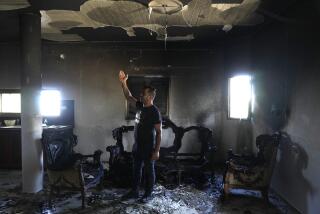Arafat Yields, Decries Killing of Israel Settler : Mideast: He quickly accedes to demands by Clinton and Rabin. PLO chairman’s condemnation of the slaying by members of his Fatah faction is unprecedented.
- Share via
JERUSALEM — Palestine Liberation Organization leader Yasser Arafat, bowing to U.S. and Israeli demands that he demonstrate his commitment to peace, Saturday condemned the murder of an Israeli settler by members of the PLO.
In his first public denunciation of a specific act of terrorism by PLO members against an Israeli, Arafat told the Palestinian news agency WAFA in Tunis, Tunisia, that “we renounce and condemn the killing of the Israeli settler (Haim) Mizrahi.”
He said the Oct. 29 slaying by five Palestinians, who were officially identified Friday as members of the PLO’s Fatah faction, had been carried out without the leadership’s knowledge. He called on all Palestinians to “stop violent acts to safeguard the peace process.”
Israeli leaders declared themselves satisfied with Arafat’s statement. Prime Minister Yitzhak Rabin, who had warned that future agreements would be endangered if Arafat did not stand by his promise to renounce terrorism, said the best response to such attacks was to continue doggedly on with negotiations.
“Arafat had to condemn it, he had to say it was against PLO instructions,” said Uri Savir, director general of the Israeli Foreign Ministry. “In any case, we won’t allow a few terrorists to claim a veto over negotiations that are good for Israel.”
President Clinton, who had also called on Arafat to condemn the killing, told reporters outside the White House on Saturday that he saw Arafat’s condemnation as a “very positive sign” that would allow Israeli-Palestinian plans for peace to go forward.
“It’s the sort of thing that will enable them to work together and to implement the (Israeli-PLO peace) accord,” Clinton said.
Arafat’s statement appeared to resolve the latest crisis to threaten progress toward realizing the historic Sept. 13 agreement under which Israel grants eventual Palestinian self-rule in the Gaza Strip and Jericho.
Talks between the two sides on concrete arrangements are scheduled to resume in Cairo on Monday; they were suspended last week because of disputes over the extent of Israel’s initial military withdrawal.
Among Jewish settlers and political hard-liners, however, the disclosure that breakaway PLO members were responsible for Mizrahi’s death heightened doubts about the deal with Arafat. In particular, settlers who met with Rabin last week were outraged that he had told them that another group, the Islamic Resistance Movement, known as Hamas, appeared to be responsible for the killing.
“I think there will be protests against this insult and this lie,” settlers leader Uri Ariel told Israel Radio.
Saturday night, hundreds of West Bank settlers and local residents protested in the Jewish quarter of Jerusalem’s Old City, where an Israeli soldier was stabbed Friday. At least 11 Israelis have been killed in recent weeks in attacks by Palestinians. The stabbed soldier remained in fair condition, and the search for his attackers continued.
“We demand security for all Jews,” Gabi Butbul, one of the leaders of the protest, told Israel Radio. “We demand that Rabin stop neglecting the shedding of our blood.”
Mizrahi was killed near the settlement of Beit El as he went to buy eggs. Israeli military sources had maintained that the killers came from Hamas, saying that a Hamas leaflet had been left at the site of the killing.
Butbul accused the Israeli government of having known for days that the killers came from Fatah but said it had “used censorship for political purposes.” He said he had heard from intelligence officers the day after the killing that it was a Fatah operation.
Israeli officials and security sources emphasized that the PLO had clearly not reneged on its agreement to refrain from terrorism; it simply did not have tight enough control on all its members and supporters to prevent them from attacking Israelis.
Savir told Israel Radio that Arafat had assured Foreign Minister Shimon Peres when they spoke by phone Friday that the PLO had not changed its position on terrorism.
In Arafat’s statement to the WAFA news agency, he said that measures would be taken to stem further attacks by PLO units, but it is not clear what he planned. The Israeli army has asked for an outline of what steps Arafat is taking to stop terrorism.
Fatah’s leaders in the occupied territories say they back the peace agreement, but they, too, appear unable to maintain full control over militants, particularly as Jewish settlers and Palestinians continue to attack each other.
Meanwhile, in Tunis, leading members of Fatah met amid rumblings of discontent from within the organization. Palestinian newspapers reported that some members planned to demand that Arafat relinquish some of his personal control and turn the leadership into more of a collective body.
More to Read
Sign up for Essential California
The most important California stories and recommendations in your inbox every morning.
You may occasionally receive promotional content from the Los Angeles Times.













